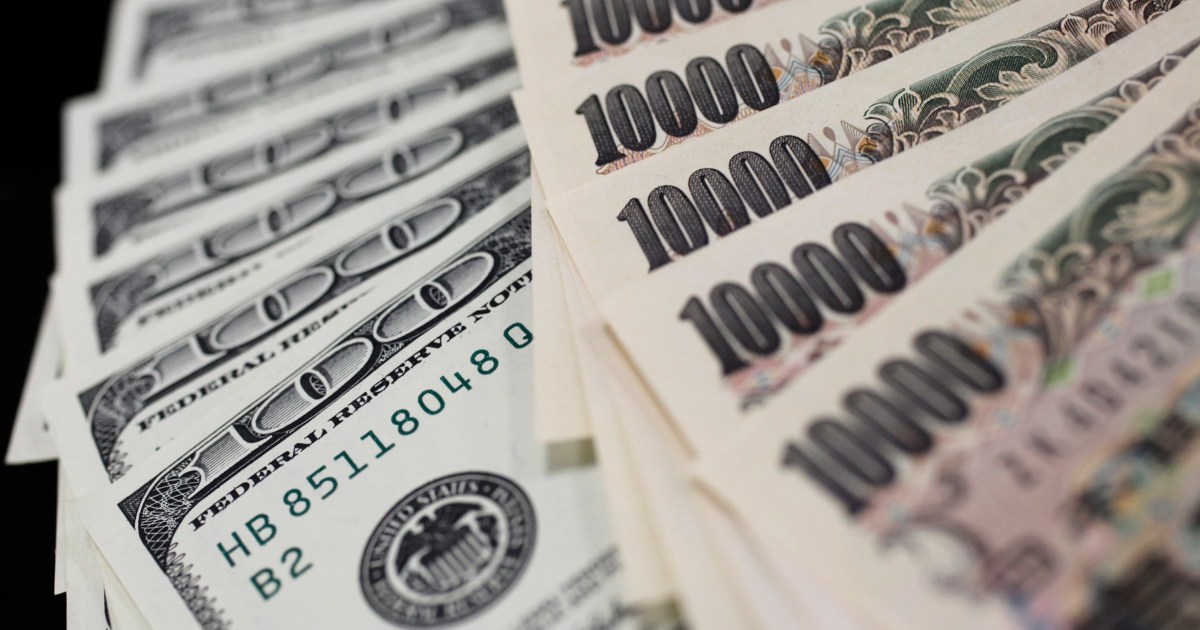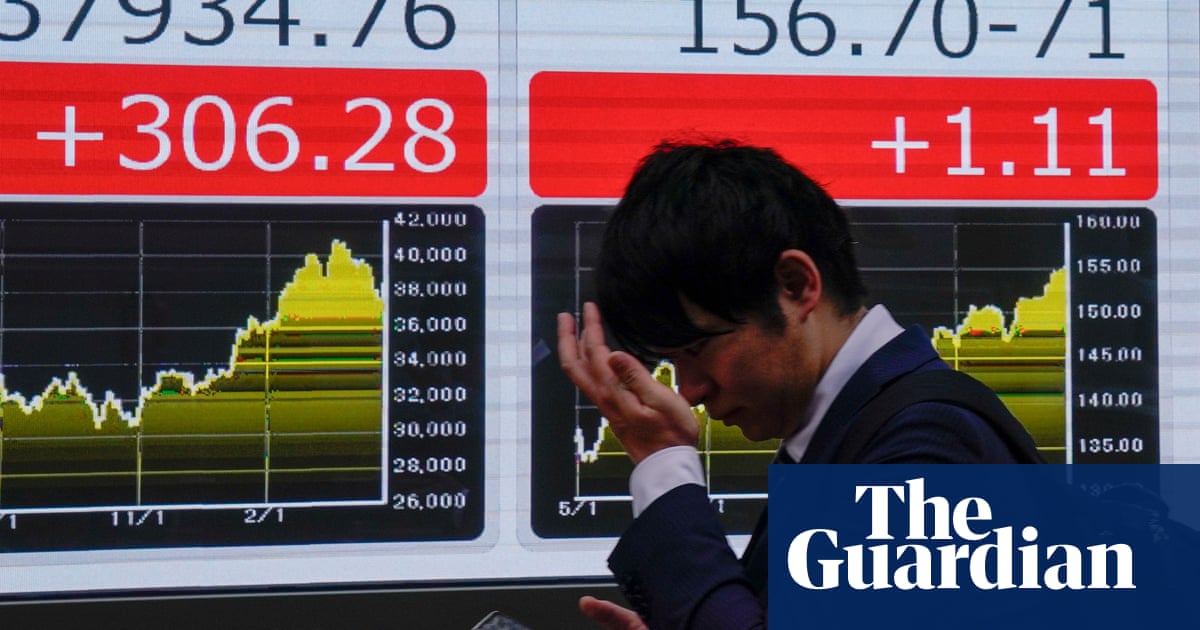
The Japanese yen recently hit its lowest value since April 1990, with the US dollar. The currency's decline is attributed to the significant interest rate gap between Japan and the US, pushing investors to seek higher returns elsewhere. While the weak yen has benefits for exporters and tourism, it raises import costs and inflation concerns. Japanese authorities may intervene to stabilize the currency, but prolonged weakness persists. The BOJ's low interest rates and recent policy changes impact the yen's value. The currency's slide poses challenges and opportunities for Japan's economy and financial stability.

(Bloomberg) -- The yen tumbled past yet another psychological milestone for the first time since 1990, raising questions about why the Japanese authorities dont appear to have stepped in to support the currency. Most Read from Bloomberg Musk Makes Surprise China Visit in Search of Tesla Revenue Boost Elliott Said to Have Built Large Stake in Buffett-Favored Sumitomo Yen Watchers Ask When Japan Will Step In as Slide Accelerates Blade to Offer Luxury Bus Service to Hamptons at Fare Up to $275 BHPs $39 Billion Copper Play Was Years in the Making The Japanese currency dropped as much as 1.2% to 160.17 per dollar on Monday amid thinned liquidity due to a local public holiday, before trading at 159.17 as investors pile on bearish positions ahead of the Federal Reserves meeting later this week.

The Bank of Japan (BOJ) decided to keep short-term interest rates in a range of zero and 0.1 percent, maintaining its policy regarding government bond buying. Japan's core inflation is expected to be around 2 percent until fiscal 2026. In Tokyo, consumer prices, excluding fresh food, rose 1.6% in April, with a significant slowdown attributed to the start of education subsidies. The Tokyo CPI data, a leading indicator for national trends, showed inflation below 2%, complicating the BOJ's decision on interest rates and inflation targets.

Asian stocks slightly rose as investors awaited economic data, corporate earnings, and the U.S. Federal Reserve's policy meeting. MSCI's index of Asia-Pacific shares outside Japan gained almost 1% for the month, with the Nikkei rising 1%. China and Hong Kong stocks showed mixed early trading. The focus is on the yen after suspected intervention lifted it from 34-year lows. Japan's top currency diplomat mentioned authorities are prepared to address foreign exchange matters 24/7. Markets anticipated Japanese intervention to support the yen as it weakened 10% against the dollar this year.

Japan's Nikkei share average closed at 38,460.08, marking a 2.4% increase and maintaining levels above 38,000 points. The tech-related shares trend, along with positive earnings in the U.S., contributed to the rise. Factors such as geopolitical concerns and profit-taking had caused fluctuations earlier. Export shares benefited from a weaker yen, with Toyota Motor rising 3.1%. Chip-related stocks, including Tokyo Electron and Advantest, made notable gains. Risks are anticipated during the U.S. earnings season, especially for big tech companies.

On Friday, April 19, 2024, Asian markets, including Japan's Nikkei 225, experienced a more than 3% decline due to significant selling pressure on semiconductor-related shares. Meanwhile, the New York Stock Exchange showed signs of potential gains amidst incoming corporate earnings, alleviating concerns about potential Federal Reserve interest rate cuts.

Asian shares traded higher with Sydney's S & P/ASX 200 up 0.6%, South Korea's Kospi surged nearly 1.0%, Hong Kong's Hang Seng jumped 1.2%, and the Shanghai Composite rose 0.6%. The market mood is positive following a tech-driven rally on Wall Street. Investors are monitoring the decline of the Japanese yen against the U.S. dollar after the Bank of Japan's decision to keep interest rates unchanged. A weak yen can benefit Japan's exporters but may harm the economy in the long run. The Federal Reserve policy meeting later this week is anticipated.

Asian shares gained momentum from Wall Street, with a focus on upcoming earnings reports from major U.S. tech companies. The Japanese yen hit fresh 34-year lows due to a strong dollar. Taiwanese and Hong Kong shares advanced, while Japanese shares edged up. Tech shares in the region performed well, except for Chinese stocks which fell. U.S. tech giants like Tesla, Meta Platforms, Alphabet, and Microsoft are set to announce their earnings this week. Market volatility is expected amidst uncertainties around the Fed's actions and geopolitical tensions in the Middle East.

Japan's Prime Minister Fumio Kishida's scandal-hit ruling Liberal Democratic Party (LDP) lost all three parliamentary seats in by-elections to the Constitutional Democratic Party of Japan. The losses, attributed to a major kickback scandal linked to political fundraising parties, threaten Kishida's position as party leader. The LDP-led ruling bloc maintains a legislative majority but may face internal challenges to replace Kishida. The scandal involves unreported political funds and has led to indictments and acknowledgments of wrongdoing by party members.

The Empire of Japan, also referred to as the Japanese Empire, Imperial Japan, or simply Japan, was the Japanese nation-state that existed from the Meiji Restoration in 1868 until the enactment of the reformed Constitution of Japan in 1947. From 29 August 1910 until 2 September 1945, it administered the naichi (the Japanese archipelago and post-1943 Karafuto) and the gaichi (Korea, Taiwan, Kwantung Leased Territory, and pre-1943 Karafuto). The South Seas Mandate was a single Japanese dependent territory in the name of the League of Nations under Japanese administration. In the closing stages of World War II, with Japan defeated alongside the rest of the Axis, the formalized Japanese Instrument of Surrender was issued in compliance with the Potsdam Declaration of the victorious Allies, and Japanese de facto territory subsequently shrunk to cover only the Japanese archipelago as it is today.Under the slogans of fukoku kyōhei and shokusan kōgyō, which followed the Boshin War and the restoration of power to the Emperor from the Shogun, Japan underwent a period of large-scale industrialization and militarization, often regarded as the fastest modernization of any country to date. All of these aspects contributed to Japan's emergence as a great power following the First Sino-Japanese War, the Boxer Rebellion, the Russo-Japanese War, and World War I. Economic and political turmoil in the 1920s, including the Great Depression, led to the rise of militarism, nationalism, statism and totalitarianism. This ideological shift eventually culminated in Japan joining the Axis alliance with Nazi Germany and Fascist Italy, and also conquering a large part of the Asia-Pacific. During this period, the Japanese army committed many atrocities, including the Nanjing Massacre.The Imperial Japanese Armed Forces initially achieved large-scale military successes during the Second Sino-Japanese War and the Pacific War. However, from 1942 onwards, and particularly after decisive Allied advances at Midway Atoll and Guadalcanal, Japan was forced to adopt a defensive stance against the United States. The American-led island-hopping campaign led to the eventual loss of many of Japan's Oceanian island possessions in the following three years. Eventually, the American military captured Iwo Jima and Okinawa Island, leaving the Japanese mainland unprotected and without a significant naval defense force. By August 1945, plans had been made for an Allied invasion of mainland Japan, but were shelved after Japan surrendered in the face of a major breakthrough by the United States and the Soviet Union, with the former detonating two atomic bombs over Hiroshima and Nagasaki and the latter invading Japan's northern territories. The Pacific War officially came to an end on 2 September 1945, leading to the beginning of the Allied occupation of Japan, during which American military leader Douglas MacArthur administered the country. In 1947, through Allied efforts, a new Japanese constitution was enacted, officially ending the Japanese Empire and forming present-day Japan. During this time, the Imperial Japanese Armed Forces were dissolved and replaced by the current Japan Self-Defense Forces. Reconstruction under the Allied occupation continued until 1952, consolidating the modern Japanese constitutional monarchy.In total, the Empire of Japan had three emperors: Meiji, Taishō, and Shōwa. The Imperial era came to an end partway through Shōwa's reign, though he remained emperor until 1989.

Japan (Japanese: 日本, [ɲihoɴ] , Nippon or Nihon, and formally 日本国, Nippon-koku or Nihon-koku) is an island country in East Asia. It is in the northwest Pacific Ocean and is bordered on the west by the Sea of Japan, extending from the Sea of Okhotsk in the north toward the East China Sea, Philippine Sea, and Taiwan in the south. Japan is a part of the Ring of Fire, and spans an archipelago of 14,125 islands, with the five main islands being Hokkaido, Honshu (the "mainland"), Shikoku, Kyushu, and Okinawa. Tokyo is the country's capital and largest city, followed by Yokohama, Osaka, Nagoya, Sapporo, Fukuoka, Kobe, and Kyoto.Japan has over 125 million inhabitants and is the 11th most populous country in the world, as well as one of the most densely populated. About three-fourths of the country's terrain is mountainous, concentrating its highly urbanized population on narrow coastal plains. Japan is divided into 47 administrative prefectures and eight traditional regions. The Greater Tokyo Area is the most populous metropolitan area in the world. Japan has the world's highest life expectancy, although it is experiencing a population decline due to its very low birth rate.Japan has been inhabited since the Upper Paleolithic period (30,000 BC). Between the fourth and ninth centuries AD, the kingdoms of Japan became unified under an emperor and the imperial court based in Heian-kyō. Beginning in the 12th century, political power was held by a series of military dictators (shōgun) and feudal lords (daimyō), and enforced by a class of warrior nobility (samurai). After a century-long period of civil war, the country was reunified in 1603 under the Tokugawa shogunate, which enacted an isolationist foreign policy. In 1854, a United States fleet forced Japan to open trade to the West, which led to the end of the shogunate and the restoration of imperial power in 1868. In the Meiji period, the Empire of Japan adopted a Western-modeled constitution, and pursued a program of industrialization and modernization. Amidst a rise in militarism and overseas colonization, Japan invaded China in 1937 and entered World War II as an Axis power in 1941. After suffering defeat in the Pacific War and two atomic bombings, Japan surrendered in 1945 and came under a seven-year Allied occupation, during which it adopted a new constitution.Under the 1947 constitution, Japan has maintained a unitary parliamentary constitutional monarchy with a bicameral legislature, the National Diet. Japan is a developed country and a great power, with one of the largest economies by nominal GDP. Japan has renounced its right to declare war, though it maintains a Self-Defense Force that ranks as one of the world's strongest militaries. A global leader in the automotive, robotics, and electronics industries, the country has made significant contributions to science and technology, and is one of the world's largest exporters and importers. It is part of multiple major international and intergovernmental institutions.Japan is a cultural superpower as the culture of Japan is well known around the world, including its art, cuisine, film, music, and popular culture, which encompasses prominent manga, anime, and video game industries.



https://www.theguardian.com/profile/jonathan-yerushalmy

John Power

PANORA

PANORA

PANORA

PANORA

PANORA

PANORA

PANORA

PANORA

Wikipedia

Wikipedia